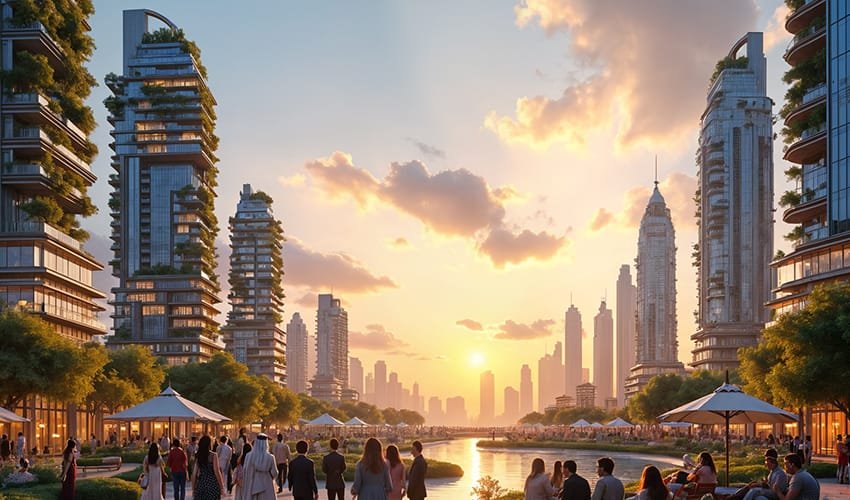Introduction
Dubai has long been at the forefront of real estate innovation, continuously adapting to global trends and challenges. In recent years, flexibility and sustainability policies have become key drivers in shaping the future of the real estate sector in the emirate. These policies not only enhance Dubai’s resilience in the face of economic, environmental, and social changes but also make the city more attractive to investors, developers, and residents.
In this article, we will explore the significance of these policies, their impact on Dubai’s real estate sector, and how they contribute to the emirate’s long-term vision for a sustainable and adaptable property market.
Understanding Flexibility and Sustainability in Real Estate
What Is Flexibility in Real Estate?
Flexibility in real estate refers to the adaptability of properties and developments to changing market conditions, tenant needs, and technological advancements. This includes:
- Modular and multi-use buildings that can easily be repurposed.
- Smart infrastructure that integrates AI and IoT for real-time adaptability.
- Flexible leasing agreements that cater to short-term and long-term tenants alike.
What Is Sustainability in Real Estate?
Sustainability in real estate involves eco-friendly construction practices, energy-efficient buildings, and long-term environmental responsibility. Sustainable real estate policies in Dubai include:
- Green Building Regulations that enforce environmentally responsible construction practices.
- Net Zero Energy Initiatives to promote renewable energy usage.
- Waste Management and Recycling Programs in residential and commercial buildings.
The Role of Flexibility Policies in Dubai’s Real Estate Market
1. Encouraging Multi-Purpose Developments
Dubai’s new urban planning strategies prioritize mixed-use developments, allowing commercial, residential, and recreational spaces to coexist. This helps developers maximize land use while ensuring a dynamic urban environment.
2. Supporting the Co-Working and Co-Living Trends
The rise of remote work and digital nomads has led to an increased demand for co-working and co-living spaces. Developers are now designing buildings with shared offices and communal living areas, catering to a more transient workforce.
3. Facilitating Short-Term and Long-Term Leasing Models
With the rapid influx of expatriates and tourists, Dubai has embraced more flexible leasing options. Policies supporting short-term rentals, serviced apartments, and digital tenancy contracts enable property owners to cater to different tenant needs efficiently.
4. Leveraging Smart Technology for Real Estate Adaptability
Smart homes and AI-driven property management systems enhance energy efficiency, security, and tenant convenience. Dubai has been actively promoting the adoption of IoT and AI-driven real estate solutions to future-proof its property sector.
Sustainability Policies and Their Impact on Dubai’s Real Estate Market
1. Green Building Regulations
Dubai has implemented stringent green building regulations, ensuring that all new developments adhere to sustainable construction standards. These policies promote:
- Efficient energy use through smart insulation and solar panels.
- Water conservation via advanced irrigation and recycling systems.
- Reduced carbon footprints by using eco-friendly building materials.
2. Sustainable Urban Planning Initiatives
Dubai’s government is integrating sustainability into its urban planning with initiatives such as:
- The Dubai 2040 Urban Master Plan, focusing on environmental sustainability.
- The Green Dubai Initiative, promoting tree-planting and green spaces.
- Sustainable public transportation expansion, reducing dependence on cars.
3. The Rise of Eco-Friendly Communities
Several real estate developers are embracing sustainable communities in Dubai. Dubai Sustainable City is a prime example, featuring solar-powered homes, electric vehicle charging stations, and water recycling systems.
4. Energy-Efficient and Net-Zero Buildings
Dubai is working toward Net Zero Energy Buildings (NZEBs) by encouraging developers to:
- Adopt solar energy solutions.
- Use AI-driven smart grids to optimize energy consumption.
- Implement waste-to-energy technologies.
Economic and Social Benefits of Flexibility and Sustainability Policies
1. Attracting Foreign Investment
Real estate investors are increasingly looking for sustainable and adaptable properties. By enforcing green building standards and flexible leasing models, Dubai strengthens its appeal as a global investment hub.
2. Enhancing Property Value and Long-Term Profitability
Properties built with sustainable materials and flexible designs tend to have higher resale values and longer life cycles. Tenants and buyers prioritize energy efficiency and lower operational costs, making sustainable buildings more attractive.
3. Creating a More Resilient Real Estate Market
By focusing on flexibility and sustainability, Dubai’s property sector can better withstand economic fluctuations and global crises, ensuring continued growth and stability.
4. Improving Quality of Life
Sustainable developments with green spaces, smart infrastructure, and energy-efficient homes enhance residents’ well-being and comfort. A healthier urban environment attracts top-tier professionals and businesses, driving economic progress.
Challenges in Implementing Flexibility and Sustainability Policies
While the benefits are substantial, some challenges remain:
- High Initial Costs: Implementing green technologies and flexible infrastructure can be costly.
- Market Adaptation: Developers and investors need time to adapt to new regulatory frameworks.
- Technological Barriers: Some advanced sustainability solutions require significant investment in research and development.
- Regulatory Enforcement: Ensuring compliance with sustainability regulations requires continuous monitoring and updates.
Future Prospects of Dubai’s Real Estate Market
Dubai’s commitment to sustainability and flexibility will shape its real estate landscape in the coming decades. Future developments are likely to include:
- Wider adoption of AI-driven real estate solutions.
- Increased reliance on blockchain for secure property transactions.
- Expansion of green energy infrastructure.
- More incentives for developers to create eco-friendly and adaptable properties.
Conclusion
The future of Dubai’s real estate sector lies in its ability to adapt, innovate, and prioritize sustainability. Through flexible leasing models, smart building technologies, and sustainable development initiatives, Dubai is positioning itself as a global leader in real estate innovation.
As the demand for eco-friendly, technologically advanced, and adaptable properties continues to grow, Dubai’s policies on flexibility and sustainability will ensure that its real estate market remains competitive, resilient, and future-ready.





Join The Discussion